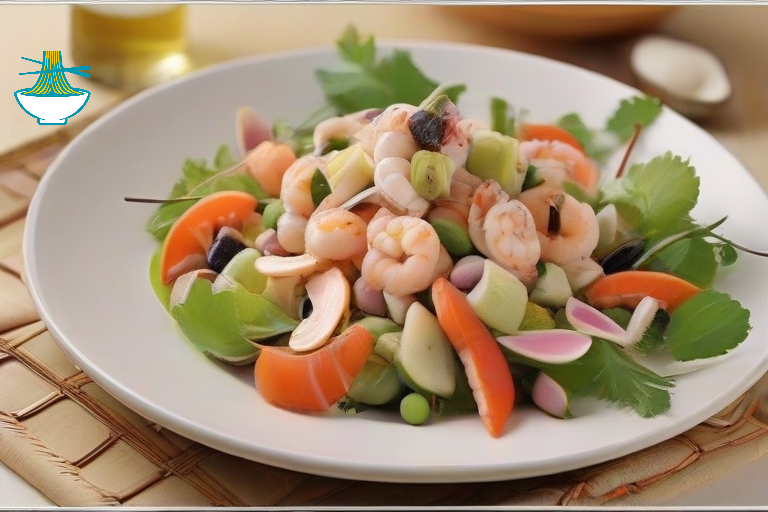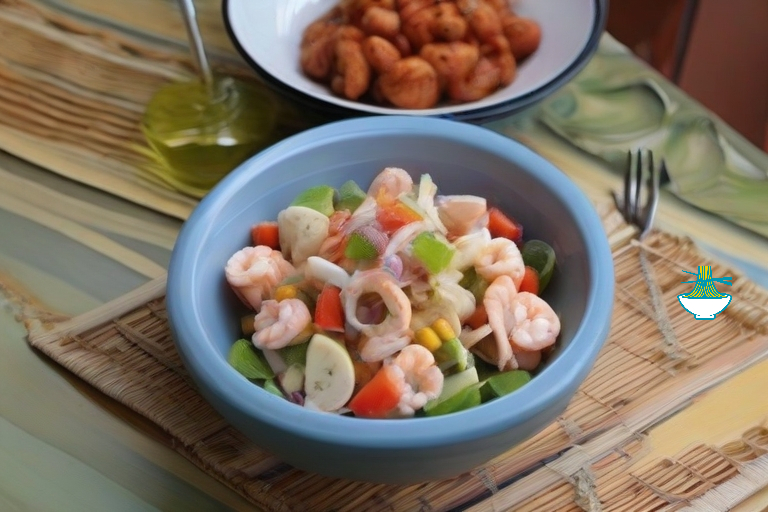Embark on a culinary journey through the vibrant flavors of the Caribbean with the Aruban SeafoodSalad, a dish that captures the essence of Aruba's sunlit shores and pristine waters. Packed with fresh seafood and tropical ingredients, this salad is a treasure trove of essential vitamins like Omega-3, Vitamin D, and B12, promoting heart health, brain function, and overall vitality. While its nutrient-rich profile boosts your well-being, moderation is key to avoid excess sodium or potential allergens from seafood. Dive into the perfect harmony of healthy indulgence, savoring a taste of paradise in every refreshing bite.

Ingredients:
For the Salad:
- 1 pound (450g) mixed seafood (shrimp, calamari, and/or scallops), cleaned and cooked
- 1 cup cherry tomatoes, halved
- 1 cup cucumber, diced
- 1/2 cup red onion, finely sliced
- 1/4 cup fresh cilantro, chopped
- 1/4 cup fresh parsley, chopped
- 1 avocado, diced
- 1 mango, peeled and diced
- 1 lime, juiced
For the Dressing:
- 1/4 cup extra-virgin olive oil
- 2 tablespoons red wine vinegar
- 1 tablespoon honey
- 1 teaspoon Dijon mustard
- Salt and pepper to taste
Instructions:
Prepare the Seafood: Cook the seafood (shrimp, calamari, and/or scallops) according to package instructions or your preferred method. Allow it to cool to room temperature.
Prepare the Dressing: In a small bowl, whisk together the olive oil, red wine vinegar, honey, Dijon mustard, salt, and pepper until well combined. Set aside.
Assemble the Salad: In a large mixing bowl, combine the cooked seafood, cherry tomatoes, cucumber, red onion, cilantro, parsley, diced avocado, and mango.
Dress the Salad: Drizzle the dressing over the salad and gently toss to coat all the ingredients evenly.
Add Citrus Zing: Squeeze fresh lime juice over the salad to add a bright, citrusy flavor. Adjust the lime juice amount to your taste preference.
Chill and Serve: Refrigerate the seafood salad for at least 30 minutes to allow the flavors to meld. This also helps to chill the salad, making it refreshing when served.
Garnish and Enjoy: Before serving, garnish the Aruban Seafood Salad with additional cilantro or parsley if desired. Serve chilled and enjoy the taste of the Caribbean!
This Aruban Seafood Salad is a delightful combination of fresh seafood, tropical fruits, and zesty dressing, making it a perfect dish for warm days or as a light and flavorful appetizer.
Frequently Asked Questions:
Is this salad suitable for people with seafood allergies?
- Unfortunately, this salad contains seafood such as shrimp, calamari, and scallops, which may not be suitable for individuals with seafood allergies. If you are allergic, it is recommended to avoid this dish or substitute the seafood with plant-based proteins or other allergy-friendly options.
Can I substitute seafood with other plant-based proteins?
- Yes, for a vegetarian or plant-based alternative, you can substitute the seafood with tofu, tempeh, or legumes such as chickpeas or beans. These substitutions can still provide a healthy, protein-rich base for the salad while keeping the tropical flavors intact.
What are the best ways to store the seafood salad?
- To store the Aruban Seafood Salad, place it in an airtight container and refrigerate it for up to 2 days. If storing leftovers, it’s best to keep the dressing separate and add it just before serving to prevent the salad from becoming soggy.
Is this salad suitable for a weight loss diet or specific diets?
- Yes, this salad can be part of a weight loss diet as it is nutrient-dense and relatively low in calories, especially if you control the amount of dressing used. The healthy fats from avocado and olive oil provide satiety, while the high protein content from seafood supports muscle health. For low-carb or keto diets, you may want to reduce the amount of mango and avocado, as they are higher in carbs.
Nutritional Values
here offer approximate values based on standard serving sizes and typical nutrient content:
Nutritional Values (Per Serving, Approximate):
Mixed Seafood (1 pound):
- Calories: 400-500
- Protein: 80g
- Fat: 5-10g
- Carbohydrates: 0g
benefits:
- Rich in high-quality protein.
- Good source of essential minerals such as iodine, selenium, and zinc.
- Omega-3 fatty acids contribute to heart health.
Cherry Tomatoes (1 cup, halved):
- Calories: 30
- Protein: 2g
- Fat: 0g
- Carbohydrates: 7g
benefits:
- Packed with antioxidants, including lycopene, which may help protectagainst certain diseases.
- Low in calories and high in vitamins A and C.
Cucumber (1 cup, diced):
- Calories: 16
- Protein: 1g
- Fat: 0g
- Carbohydrates: 4g
benefits:
- Hydrating due to its high water content.
- Low in calories and provides vitamins K and C.
- Contains antioxidants and may contribute to skin health.
Red Onion (1/2 cup, finely sliced):
- Calories: 30
- Protein: 1g
- Fat: 0g
- Carbohydrates: 7g
benefits:
- Contains antioxidants and anti-inflammatory compounds.
- May have cardiovascular benefits and help regulate blood sugar.
Fresh Cilantro (1/4 cup, chopped):
- Calories: 1
- Protein: 0g
- Fat: 0g
- Carbohydrates: 0g
benefits:
- Rich in antioxidants and essential oils.
- Contains vitamins A, C, and K.
- May have antimicrobial properties.
Fresh Parsley (1/4 cup, chopped):
- Calories: 1
- Protein: 0g
- Fat: 0g
- Carbohydrates: 0g
benefits:
- Excellent source of vitamins K, C, and A.
- Contains flavonoids with anti-inflammatory and antioxidant properties.
- May support bone health.
Avocado (1 medium, diced):
- Calories: 240
- Protein: 3g
- Fat: 22g
- Carbohydrates: 12g
benefits:
- Avocado is packed with heart-healthy monounsaturated fats, healthy monounsaturated fats, which can help reduce bad cholesterol (LDL) levels while increasing good cholesterol (HDL).
- rich in potassium to help regulate blood pressure, and provides fiber that aids in digestion and promotes satiety.
Mango (1 medium, peeled and diced):
- Calories: 60
- Protein: 1g
- Fat: 0.5g
- Carbohydrates: 15g
benefits: Mango is high in vitamins A and C, which support immune function and aid in iron absorption. It contains dietary fiber for healthy digestion, may help reduce constipation, and is rich in antioxidants like beta-carotene, which contribute to skin health.
Lime Juice (from 1 lime):
- Calories: 10
- Protein: 0g
- Fat: 0g
- Carbohydrates: 3g
benefits:
- Excellent source of vitamin C, promoting immune health.
- Adds a refreshing citrus flavor to dishes.
Extra-Virgin Olive Oil (1/4 cup):
- Calories: 480
- Protein: 0g
- Fat: 54g
- Carbohydrates: 0g
benefits:
- Healthy monounsaturated fats may support heart health.
- Contains antioxidants with anti-inflammatory properties.
- May contribute to improved cholesterol levels.
Red Wine Vinegar (2 tablespoons):
- Calories: 10
- Protein: 0g
- Fat: 0g
- Carbohydrates: 2g
benefits:
- Contains acetic acid, which may aid digestion.
- May have blood sugar-lowering effects.
Honey (1 tablespoon):
- Calories: 60
- Protein: 0g
- Fat: 0g
- Carbohydrates: 17g
benefits:
- Natural sweetener with antioxidant and antibacterial properties.
- Provides energy in the form of natural sugars.
Dijon Mustard (1 teaspoon):
- Calories: 5
- Protein: 0g
- Fat: 0g
- Carbohydrates: 1g
benefits:
- Low in calories and adds a tangy flavor.
- Contains mustard seeds, which are rich in selenium and magnesium.
Salt and Pepper (to taste):
- Negligible in terms of calories, protein, fat, and carbohydrates.
benefits:
- Enhance flavor but should be used in moderation.
- Salt provides essential sodium, important for fluid balance.
- Pepper contains piperine, which may enhance nutrient absorption.
Remember, these are general estimates, and actual nutritional values may vary based on specific brands and preparation methods. If you have specific dietary concerns or goals, it's advisable to consult with a nutritionist or use a nutrition calculator for more accurate information.


Comments